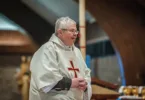by Kara Hansen
KANSAS CITY, Kan. — It’s a higher level of responsibility — and a humbling one.
During a Mass on April 18 at Savior Pastoral Center in Kansas City, Kan., 20 men took one step closer to becoming permanent deacons for the archdiocese by being installed as acolytes.
The next step is ordination, which will take place in January 2011.
“It was a very emotional and humbling experience,” said Michael Hill, a parishioner at St. Paul in Olathe. “A lot of work has gone into getting to where we are and it’s very humbling to be selected as members of the first class of men studying to become deacons.”
The group has been in formation since February 2006, gathering for class together at least one full weekend a month with plenty of time for individual study between sessions. The program includes prayer, ministry, discernment, and spiritual direction as well.
“To be judged worthy to be promoted in taking another step toward the diaconate is very humbling, and it continues to be a discernment of how far we’ve come in our faith,” said Hill. “It’s a tremendous honor to know the archbishop and priests of the archdiocese see a need for this.”
The role of permanent deacon was reinstated in the Catholic Church after the Second Vatican Council. Candidates to become the archdiocese’s first permanent deacons are called to discern their vocation to the diaconate in the same way a seminarian discerns his vocation to the priesthood.
Once ordained, permanent deacons are able to celebrate baptisms, preside at marriages held outside of Mass, lead prayer services, and preside at wakes and funerals. During Mass, deacons can assist the priest during the Eucharist and they are able to read the Gospel and give a homily.
“The special part for me is the idea of being more intimately united with the altar and service during Mass,” said Chris Seago, a parishioner of Mater Dei Parish in Topeka, who is studying to become a deacon. “We will be more closely united with the body and blood of Christ during the liturgy, which flows over into our own lives and becomes internalized.”
As acolytes, the men will serve in an expanded role during any liturgies. Preparing water and wine for Mass, carrying in the cross during the procession, lighting the candles, assisting the priest as needed during Mass, and purifying the cup and paten after the Eucharist are a few of the ways the acolytes will have a larger role in the Mass.
Though the group still has another 20 months of study and formation, they are enthused about the new responsibilities that come with being an acolyte.
“I don’t think you ever get to the point of believing you’re really worthy for this,” said Seago. “It seems like the closer I get to God, the more aware I become of how unworthy I am. But I keep learning how to give of myself to others, even when there are times I would rather be doing something else.”






